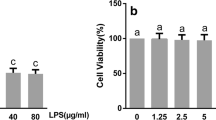Abstract
Objective: To study the expression of the inducible nitric oxide synthase (iNOS) gene and the effects of tumor necrosis factor- α (TNF-α) and interferon- γ (IFN-γ)on proliferation of the continuous cultured human colon cancer cell line CCL229. Methods: Using the molecular and biochemical techniques and electron microscopy to analyze the expression of iNOS, production of NO and growth characteristics of human colon cancer cells. Results: cytokine treatment can induce expression of the iNOS gene and production of nitric oxide was significantly higher after treatment of CCL229 cells with TNF- α or IFN- γ. Treatment with either cytokine or a combination of both significantly increased levels of Malondialdehyde (MDA) over control. Furthermore, cytokine treatment increased the proliferation inhibition rate as assessed in vitro and decreased the cell proliferation index on flow cytometry. Electron microscopy showed that cells treated with cytokines had fewer pseudopodia or cell processes than control cells and that cytokine treated cells had dilatation of the mitochondria and endoplasmic reticulum and dilated vesicular or tubular cisternae. Conclusion: Our findings indicate that TNF-α and IFN-γ induce the expression of iNOS gene in CCL229 cells, which increases the production of nitric oxide, inhibits proliferation, causes lipid peroxidation, and results in ultrastructural changes.
Similar content being viewed by others
References
Nathan C. Nitric oxide as a secretory product of mammalian cells. FASEB J 1992; 6: 3051.
Geller DA, Lowenstein CJ, Shapiro RA, et al. Molecular cloning, expression of inducible nitric oxide synthase from human hepatocytes. Proc Natl Acad Sci USA 1993; 90:3491–3495.
Nicole A, Chartrain D A, Geller, et al. Molecular cloning, structure, and chromosomal localization of the human inducible nitric oxide synthase gene. J Biol Chem 1994; 269: 6765.
Jenkins DC, Charles Ig, Baylis SA, et al. Human colon cancer cell lines show a diverse pattern of nitric oxide synthase gene expression and nitric oxide generation. Br J Cancer 1994; 70: 847.
Jenkins D C, Charles IG, Thomsen LL, et al. Roles of Nittoku oxide in tumor growth. Proc Natl Acad Sci USA 1995; 92: 4392.
Sherman P A, Launch V E, Rep B R, et al. Purification and cDNA sequence of inducible nitric oxide syntheses from a human tumor cell line. Biochemistry 1993; 32: 11600.
Mills C D, Shearer J, Evans R, et al. Macrophage arginine metabolism and the inhibition or stimulation of cancer. J Immunol 1992; 149: 2709.
Haywood GA, Tsao PS, Von der Leyen HE, et al. Expression of inducible nitric oxide synthase in human heart failure. Circulation. 1996; 93: 1087.
Ignarro LJ, Fukuto JM, Griscavage JM, et al. Oxidation of nitric oxide in aqueous solution to nitrite but not nitrate: Comparison with enzymatically formed nitric oxide from L-arginine. Proc Natl Acad Sci USA 1993; 90: 8103.
Buege J A, Aust S D. Microsomal lipid peroxidation. Methods Enzymol 1978; 52: 302.
Carmichael J, Mitchell JB, Degraff WG, et al. Chemosensitivity testing of human lung cancer cell lines the MTT assay. Br J Cancer 1988; 57: 540.
Nicoletti I, Migligrati G, Pagliacci M C, et al. A rapid and simple method for measuring thymocyte apoptosis by propidium iodine staining and flow cytometry. J Immuno Methods 1991; 139: 271.
Changhui G, Jindan S. Structural and cytochemical (G6Pase) Changes of endoplasmic reticulum in human colorectal adenocarcinoma induced cell induced by retinoic acid. Chinese Journal of Physical Medicine. 1995; 17: 223.
Linn SC, Morelli PJ, Edry I, et al. Transcription regulation of human inducible nitric oxide synthase gene in intestinal epithelial cell line. Am J Physiol 1997; 272: G1499.
Geller DA, Billar TR. Molecular biology of nitric oxide synthase. Cancer Metastasis Rev 1998; 17: 7.
Xie K, Fidler IJ. Therapy of cancer metastasis by activation of the inducible nitric oxide synthase. Cancer Metastasis Rev 1998; 17: 55.
Author information
Authors and Affiliations
Corresponding author
Additional information
Foundation item: This work was supported by a grant from the Scientific Research Foundation of Ministry of Public Health of PR China (No. 96-1-204).
Biography: Pang Xi-ning(1957–), male, associate professor, China Medical University, majors in cell biology and developmental biology.
Rights and permissions
About this article
Cite this article
Pang, Xn., Wang, Yq. & Song, Jd. Effect of TNF-α and IFN-γ on the expression of inducible nitric oxide synthase gene and proliferation inhibition of human colon cancer cell line. Chin. J. Cancer Res. 14, 131–136 (2002). https://doi.org/10.1007/s11670-002-0029-0
Received:
Accepted:
Issue Date:
DOI: https://doi.org/10.1007/s11670-002-0029-0




